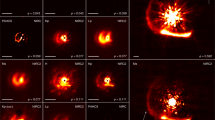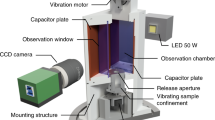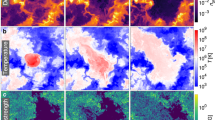Abstract
A particle moving through a sea of stochastic impulses gains energy from the sea; this is a long-established property of brownian motion, given theoretical backing in the fluctuation–dissipation theorem1. However, this energy gain is generally neglected in describing circumstellar dust grains as slowly spiralling into the central star under Poynting–Robertson (P–R) drag. Stochastic forces on circumsolar grains arise from low-frequency fluctuations in surface charge and interplanetary fields, as has long been recognized2,3, but previous studies have treated the mean orbital energy as constant4,5 or slowly decreasing6. I show here that stochastic heating can balance and indeed overwhelm the dissipative P–R drag for small grains (≲1 µm scale radius). Furthermore, the consequent drift to the outer Solar System may cancel the strong collisional source inferred7 for micrometre and sub-micrometre fragments, explaining how their present distribution is stable in time. More generally, the stochastic heating mechanism combined with collisional fragmentation sets limits on dust accretion onto cool stars.
This is a preview of subscription content, access via your institution
Access options
Subscribe to this journal
Receive 51 print issues and online access
$199.00 per year
only $3.90 per issue
Buy this article
- Purchase on Springer Link
- Instant access to full article PDF
Prices may be subject to local taxes which are calculated during checkout
Similar content being viewed by others
References
Kubo, R. Rep. Prog. Phys. 29, 255–285 (1966).
Parker, E. N. Astrophys. J. 139, 951–958 (1963).
Morfill, G. E. & Grün, E. Planet. Space Sci. 27, 1283–1292 (1979).
Consolmagno, G. Icarus 38, 398–410 (1979).
Barge, P., Pellat, R. & Millet, J. Astr. Astrophys. 115, 8–19 (1982).
Wallis, M. K. & Hassan, M. H. A. Astr. Astrophys. 151, 435–441 (1985).
Grün, E., Zook, H. A., Fechtig, H. & Giese, R.H. Icarus 62, 244–272 (1985).
Marshall, T. W., Claverie, P. J. math. Phys. 21, 1819–1825 (1980).
Marshall, T. W. Physica 103A, 172–182 (1980).
Burns, J. A., Lamy, Ph. L. & Soter, S. Icarus 40, 1–48 (1979).
Leinert, C., Röser, S. & Buitrago, J. Astr. Astrophys. 118, 345–357 (1983).
Yabushita, S. Astr. Astrophys. 85, 77–79 (1980).
Mukai, T. & Yamamoto, T. Astr. Astrophys. 107, 97–100 (1982).
Voschinnikov, N. V. & Il'in, V.B. Pis'ma Astr. Zh. 9, 188–192 (1983). (Soviet Astr. Lett. 9, 101–103; 1983).
Lamy, Ph. L. & Perrin, J. M. in Solid Particles in the Solar System (eds Halliday, I. & Mclntosh, B. I.) 75–80 (Reidel, Dordrecht, 1980).
Whipple, F. L. in Zodiacal Light and the Interplanetary Medium 409–326 (NASA SP-150 1967).
Author information
Authors and Affiliations
Rights and permissions
About this article
Cite this article
Wallis, M. Random fluctuations versus Poynting–Robertson drag on interplanetary dust grains. Nature 320, 146–148 (1986). https://doi.org/10.1038/320146a0
Received:
Accepted:
Issue Date:
DOI: https://doi.org/10.1038/320146a0
This article is cited by
-
Optical properties of spheroidal particles
Astrophysics and Space Science (1993)
Comments
By submitting a comment you agree to abide by our Terms and Community Guidelines. If you find something abusive or that does not comply with our terms or guidelines please flag it as inappropriate.



